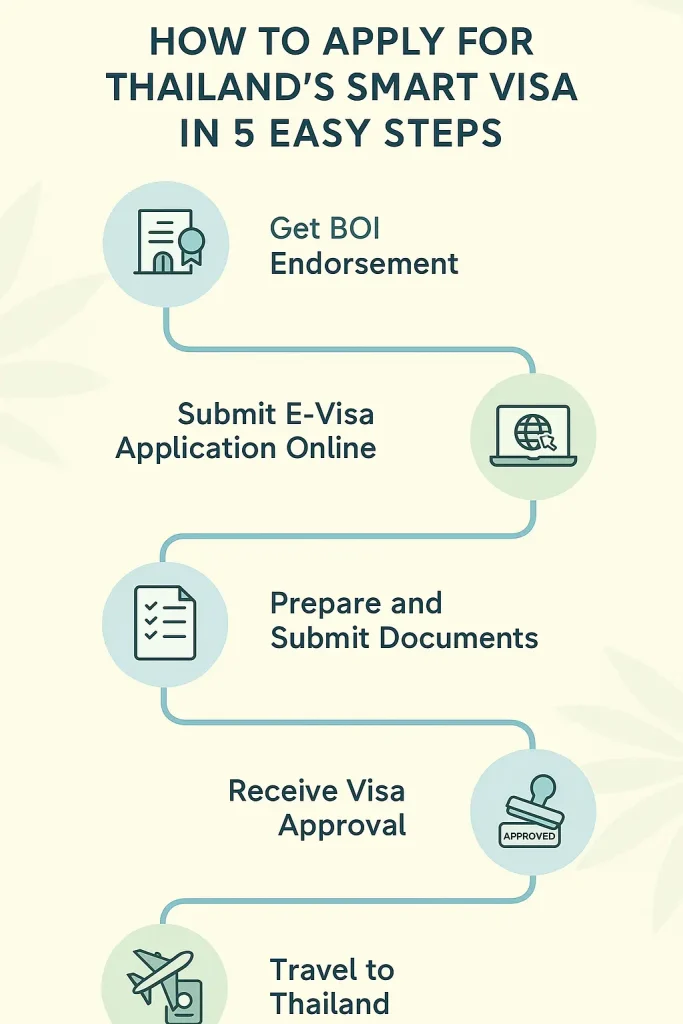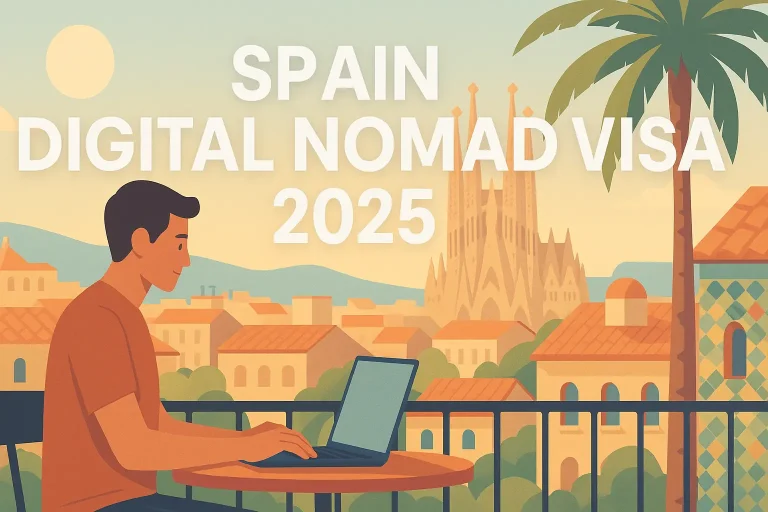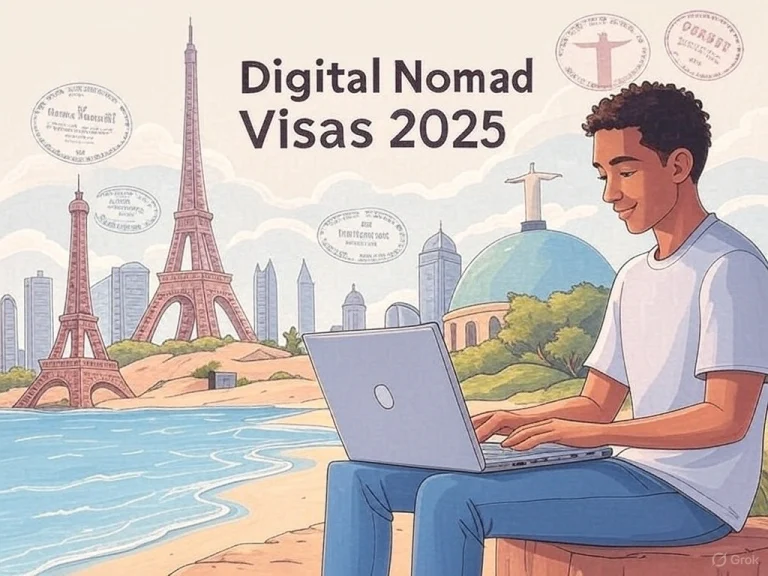🇹🇭 Thailand Digital Nomad Visa 2025: Smart Visa & DTV Guide
Dreaming of living and working in Thailand? Here’s how the new Smart Visa and long-term stay options can make it possible in 2025.

In a world where remote work is redefining lifestyles, digital nomad visas offer the freedom to live and work across borders. Thailand, with its rich culture, vibrant cities, stunning beaches, and affordable cost of living, stands out as a dream destination. Ranked among the top 5 locations for digital nomads globally by NomadList in 2024, Thailand now offers even more welcoming visa pathways.
In this guide, we’ll explore everything you need to know about Thailand’s Smart Visa, new long-term stay options, and what makes Thailand an unbeatable choice for your next remote working adventure.
Smart Visa Overview
For digital nomads and professionals aiming for a long-term stay in Thailand, the Smart Visa offers a streamlined solution. Tailored to highly skilled workers, startup founders, investors, and executives in targeted industries, this visa allows remote workers to bypass traditional work permit hurdles.
Let’s dive deeper into who qualifies, how to apply, what documents you’ll need, and the fees involved.

Eligibility Criteria:
- Professionals in targeted industries such as next-gen automotive, smart electronics, or digital technology.
- Monthly income of at least 100,000 THB (~$2,900).
- Startup entrepreneurs (Smart “S” visa) and retirees (Smart “E” visa) require 50,000 THB (~$1,450) monthly (source).
- Employment contract valid for at least one year.
- Endorsement from Thailand’s Board of Investment (BOI).
Application Process:
- Apply for an endorsement through the BOI.
- Submit an e-visa application online.
- Upon approval, receive the Smart Visa.
Required Documents:
- Passport valid for at least six months.
- Passport-sized photograph.
- Employment contract or proof of startup ownership.
- Proof of qualifications and experience.
- BOI endorsement letter.
Processing Time and Fees:
- Typically around 30 working days, depending on volume.
- Fees:
- 1 year: 500 SGD
- 2 years: 1,000 SGD
- 3 years: 1,500 SGD
- 4 years: 2,000 SGD
You can find detailed guidelines and updates on eligibility at the Thailand Smart Visa Official Website.
Other Long-Term Stay Options
While the Smart Visa is an excellent pathway, it’s not the only option. Thailand offers several other long-term visas catering to different lifestyles, from retirees to business owners and students.
Whether you plan to work, study, or simply enjoy Thailand’s beauty, there’s likely a visa that fits your needs. Here’s a detailed look at each.
Non-Immigrant B Visa (Work Visa)
The Non-Immigrant B Visa is ideal for individuals planning to work directly for a Thai company or start a registered business within the country. Unlike the Smart Visa, it requires a work permit and often involves an employment sponsorship process. Let’s walk through the key aspects.
- Valid passport.
- Employment contract with a Thai company.
- Approval from the Ministry of Labour.
- Proof of financial means (20,000 THB per person).
Application through embassies or the e-Visa system. Valid for one year, renewable with proper documentation.
Retirement Visa (O-A and O-X)
Thailand has long been a preferred retirement destination, and its Retirement Visas offer an easy gateway for those over 50 seeking a relaxed lifestyle. These visas require substantial financial proof but provide long-term stability without work permit requirements.
- Age 50+.
- Financial proof:
- O-A: 800,000 THB in a Thai bank account or a monthly income of 65,000 THB.
- O-X: 3 million THB savings or a mix of savings and income.
- Health insurance mandatory for coverage in Thailand.
Education Visa (ED Visa)
For those wanting to immerse themselves in Thai language, culture, or academic studies, the Education Visa provides an attractive opportunity. It allows you to live legally in Thailand while pursuing an educational program.
- Letter of acceptance from a certified institution.
- Valid passport and visa application form.
- Financial proof to support living costs.
Initially valid for 90 days, extendable up to one year depending on the course.
Destination Thailand Visa (DTV)
The Destination Thailand Visa (DTV), introduced in 2024, is a game-changer for digital nomads. Designed specifically for remote workers, freelancers, and online entrepreneurs, it offers long-term flexibility unmatched by previous visas.
- Valid for 5 years with multiple entries.
- Each stay up to 180 days, extendable once for another 180 days.
- Financial proof: 500,000 THB (~$13,600) savings.
- Application available through Thai embassies, consulates, or the Thai e-Visa system.
Applications for Smart Visas and Destination Thailand Visas can be submitted online via the Thailand eVisa Official Portal.
Comparison Table
Choosing the right visa depends largely on your personal goals, whether you prioritize remote work freedom, studying, or retirement. Here’s a snapshot comparison to help you quickly identify which path may suit you best.
| Visa Type | Purpose | Validity | Financial Requirement | Work Permit Needed |
|---|---|---|---|---|
| Smart Visa | Skilled professionals | Up to 4 years | 50,000–100,000 THB/month | No |
| Non-Immigrant B Visa | Employment in Thailand | 1 year | 20,000 THB per person | Yes |
| Retirement Visa | Retirement | 1–5 years | 800,000–3,000,000 THB | No |
| Education Visa | Study | Up to 1 year | Tuition fees and living costs | No |
| DTV | Digital nomads | 5 years | 500,000 THB savings | No |
Visa rules and financial requirements are subject to change; always verify with official sources.
Practical Tips for Digital Nomads
Beyond visas and paperwork, thriving as a digital nomad in Thailand means knowing where to work, live, and take care of yourself. Here are some essential tips to help you settle in comfortably and maximize your Thailand experience.
- Work-Life Balance: Bangkok (city vibe), Chiang Mai (peaceful nomad hub), Phuket/Koh Samui (beach life).
- Cost of Living: Bangkok ($1,200–$1,800), Chiang Mai ($800–$1,200), Phuket ($1,000–$1,500).
- Healthcare: High-quality private hospitals; recommended expat insurance providers include Cigna Global, SafetyWing, and Allianz Care.
- Internet: Reliable speeds (~200–300 Mbps) with great coworking spaces like The Hive and Hubba.
For more detailed information on healthcare systems and choosing insurance coverage, visit the Expat Health Insurance Guide for Thailand.
Future Trends and Update
Thailand is not slowing down in making itself a digital nomad paradise. From digital immigration cards to policies aiming to attract over a million digital workers by 2027, exciting changes are ahead. Staying updated ensures you’ll benefit from these opportunities as they unfold.
- Digital Arrival Card (TDAC) replacing paper TM6 forms from May 2025.
- Thailand targets 1 million digital nomads by 2027 under national economic plans.
- Continued simplification of e-visa processes.






